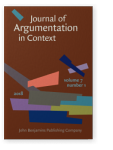Vol. 7:1 (2018) ► pp.72–100
Defending either a personal or an assigned standpoint
Role play in supporting secondary school students’ argumentation face to face and through chat
This study clarifies whether a specific type of role play supports upper secondary school students’ collaborative argumentation. Data consist of 12 dyadic face-to-face and 12 chat debates. Data analysis focused on the quality of students’ argumentation. Comparisons were made between students who defended standpoints at variance with their personal opinions on the topics, between the two study modes and topics, and by gender. When the students defended a standpoint differing from their personal opinion, the male students engaged in counterargumentation more often than the female students. When, in turn, the students defended their personal standpoint, they produced both counterargumentative and non-argumentative speech turns equally often, and their arguments were more poorly elaborated than when they defended an assigned standpoint. The study suggests that role play in which both counterargumentation and students’ personal standpoints on an issue are taken into account is a viable means to support students’ high quality argumentation.
Article outline
- 1.Introduction
- 2.Role play as a means to stimulate argumentation
- 3.Role play in this study
- 4.Research questions
- 5.Method
- 5.1Teaching experiment
- 5.2Data
- 5.3Data analysis
- 5.3.1Argumentativeness
- 5.3.2Argument elaboration
- 5.3.3Statistical analyses
- 6.Results
- 6.1Quality of students’ argumentation in general
- 6.2Quality of students’ argumentation by standpoint and gender
- 6.3Quality of students’ argumentation by topic and gender
- 6.4Quality of students’ argumentation by study mode and gender
- 7.Discussion
-
References
